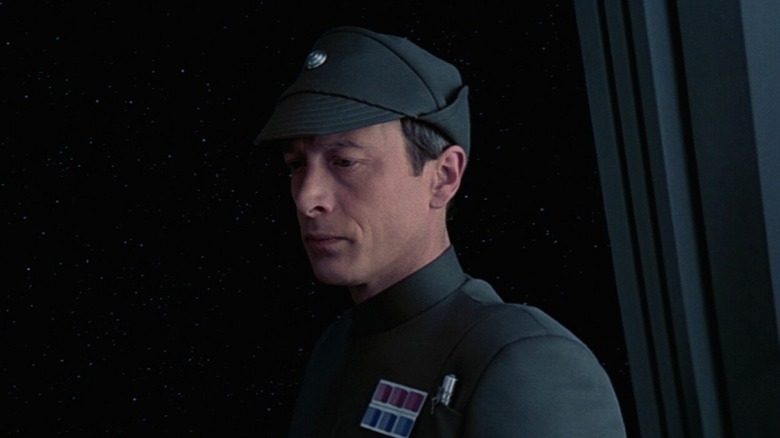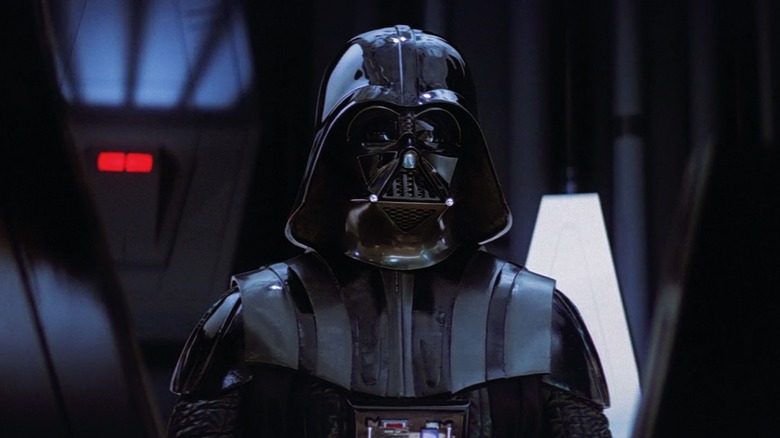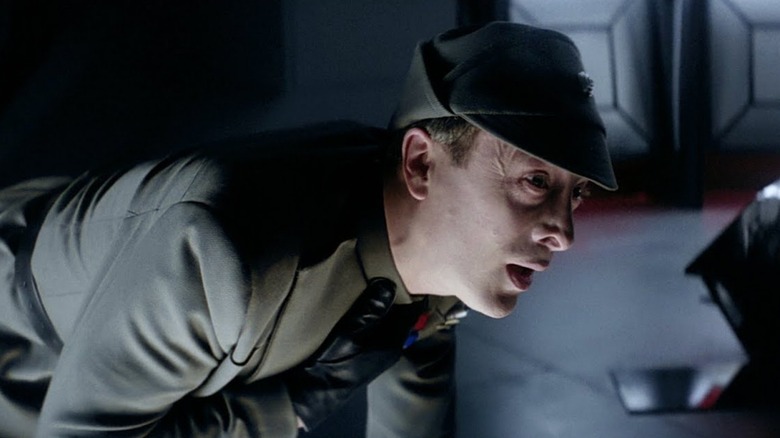Late Star Wars Actor Michael Culver Took The Spotlight In One Of The Franchise's Best Moments
If the original "Star Wars" established Darth Vader as one of the most fearsome and instantly iconic villains of all time, then "The Empire Strikes Back" was the one tasked with showing us why he was worthy to continue wearing that crown moving forward — and that wouldn't have been possible without one hapless supporting character who, despite a minimum of screen time, ended up taking on a life of his own among the passionate fanbase.
Actor Michael Culver sadly passed away at the age of 85 this past February (as only recently reported by Independent), leaving behind a legacy that spanned years of theater work, a significant role in the "Return of Sherlock Holmes" drama series, his memorable performance in David Lean's Oscar-winning "A Passage to India," and, of course, one of the most famous character deaths in all of fiction. As the doomed Imperial Captain Lorth Needa, Culver portrayed a minor villain that would go on to play a deceptively important role that reverberated throughout "The Empire Strikes Back." Needa might not have been a huge influence in the grand scheme of things, participating in the Empire's stunning victory over the Rebellion during the Battle of Hoth and subsequently leading his starship "Avenger" in hunting down Rebel stragglers in the aftermath, but it was his actions during the failed attempt to capture the Millennium Falcon (along with our heroes on board) that ultimately sealed his fate ... and set him apart from any Imperial officer we'd ever seen.
In the process, Culver became responsible for arguably one of the greatest moments in "Star Wars" franchise history.
He means business
At its heart, "Star Wars" is many things at once. It's an unapologetic Vietnam War allegory, a children's fairytale writ large on a Campbellian scale, and a distillation of various influences like Akira Kurosawa, Frank Herbert's "Dune," and more. But the tragic fate of Captain Needa proves that, more than anything else, "The Empire Strikes Back" is a feature-length metaphor for the most important of topics: workplace drama.
How else can one explain every scene that Needa appears in throughout the acclaimed sequel (in which we're given a firsthand look at the Imperial war machine's hierarchy of power)? "A New Hope" made very little attempt to clarify Vader's actual role in the Empire, placing him somewhere below the likes of Grand Moff Tarkin and the members of the war conference on the Death Star, but clearly in a more trusted position than the average Imperial crony. Yet Needa's scenes (and Culver's pitch-perfect performance, exuding calmness on the outside and sheer terror on the inside) prove beyond a shadow of a doubt that Vader is, in fact, the boss. Having witnessed firsthand the consequences of failure, particularly when Admiral Ozzel makes the fatal mistake of underestimating the Rebels at Hoth and is summarily Force-choked to death by an irate Vader, Needa knows the margin for error is razor-thin. And like a dogged employee eager to prove his worth to a demanding boss, every action the good Captain takes from that point forward reflects the life-or-death stakes of his precarious position.
There's a good reason why fans gravitated towards Needa over the years. (This Uproxx article by Mike Ryan succinctly captures the character's appeal.) Space Nazi or not, he symbolized the most relatable of characters in this fantastical universe: a blue-collar grunt literally worked to death for very little gain.
Apology accepted
You know what's even worse than getting let go from a job through a coldly impersonal email? Voluntarily meeting your boss in person after a major screw-up, responsibly owning up to your mistakes so nobody else takes the fall, and getting Force-strangled to death for your trouble ... followed by a painfully sarcastic barb delivered before your corpse has even cooled. No wonder Needa's death scene continues to stand the test of time, playing out like the hilarious "Are we the baddies?" sketch as Needa realizes — far too late, of course — just what kind of monstrous, authoritarian regime he joined up for.
"Sympathetic" is probably the wrong word to describe Needa's ultimate role in the franchise, but it's to the late Michael Culver's enduring credit that he managed to take what was a nothing-burger of a role on the page and turn Needa's failures into a quietly tragic arc playing out in the distant background of Luke Skywalker, Han Solo, and Leia Organa's heroics. In so doing, this otherwise anonymous Imperial Captain became a stand-in for the full might of Vader's villainy and the nigh-impossible demands that the Empire expected of its fascistic underlings. It upped the ante for our main characters and indirectly hinted at the cost if they should fail. And, yeah, it eventually led to one of the funniest satirical videos ever through the Robot Chicken Force-choke gag. Now that's a legacy to be proud of.
So rest in peace, Michael Culver. Even for a franchise known for minor characters suddenly gaining ridiculous amounts of fame and attention, Captain Needa stands above the rest. All he wanted was to do his bloody job, and what did he get? Only an iconic moment in a series full of iconic moments, one that we'll remember forever.


